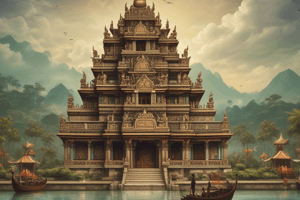Podcast
Questions and Answers
Which of the following is NOT mentioned as one of the traditional skills preserved by the Arts and Handicraft Centre?
Which of the following is NOT mentioned as one of the traditional skills preserved by the Arts and Handicraft Centre?
- Silver-smithing
- Bronze tooling
- Pottery (correct)
- Cloth weaving
What is the primary role of the Sultan in Brunei's governance system?
What is the primary role of the Sultan in Brunei's governance system?
- The Sultan's role is limited to ceremonial duties and cultural preservation.
- The Sultan holds a symbolic position, with the Prime Minister exercising executive power.
- The Sultan is primarily responsible for economic policy and diversification.
- The Sultan serves as both the head of state and the religious leader. (correct)
What is the primary economic challenge faced by Brunei, as described in the text?
What is the primary economic challenge faced by Brunei, as described in the text?
- Insufficient investment in infrastructure development
- Overreliance on imported goods and services
- Dependence on non-renewable resources like oil and gas (correct)
- Lack of skilled labor in the manufacturing sector
Which of the following museums plays a role in preserving Bruneian cultural heritage?
Which of the following museums plays a role in preserving Bruneian cultural heritage?
Which of the following statements accurately describes the role of Islam in Bruneian culture, as mentioned in the text?
Which of the following statements accurately describes the role of Islam in Bruneian culture, as mentioned in the text?
What has significantly influenced various aspects of life in Timor-Leste?
What has significantly influenced various aspects of life in Timor-Leste?
How do the people of Timor-Leste respond to the struggles they face historically?
How do the people of Timor-Leste respond to the struggles they face historically?
Which language is widely spoken in Timor-Leste?
Which language is widely spoken in Timor-Leste?
What does the text imply about the autonomy of countries like Timor-Leste within Southeast Asia?
What does the text imply about the autonomy of countries like Timor-Leste within Southeast Asia?
How has conflict impacted the physical landscape of Timor-Leste?
How has conflict impacted the physical landscape of Timor-Leste?
Flashcards
What is Brunei?
What is Brunei?
A small sovereign nation on the northwest coast of Borneo Island.
14th-16th Century Brunei
14th-16th Century Brunei
Brunei was the center of a powerful Malay sultanate with influence over Sabah, Sarawak, and the lower Philippines.
Brunei's Dynasty
Brunei's Dynasty
Brunei has one of the oldest continuously ruling dynasties in the world.
Decline of Brunei
Decline of Brunei
Signup and view all the flashcards
British Protectorate
British Protectorate
Signup and view all the flashcards
Brunei's Independence
Brunei's Independence
Signup and view all the flashcards
Islam in Brunei
Islam in Brunei
Signup and view all the flashcards
Brunei's Economy
Brunei's Economy
Signup and view all the flashcards
Arts and Handicraft Centre
Arts and Handicraft Centre
Signup and view all the flashcards
Study Notes
Brunei: A Traditional Malay Kingdom in the Malay World
Overview
Brunei is a small sovereign nation located on the northwest coast of Borneo Island, between the South China Sea to its north and the Malaysian state of Sarawak to its other sides. The country has a total land area of approximately 5,765 square kilometers and is known for being richly endowed with cultural heritage that has been steadily maintained until today. Brunei's history dates back to the 14th century when it was the center of a powerful Malay sultanate extending over Sabah, Sarawak, and the lower Philippines.
History from the 14th to the 16th Centuries
Brunei Darussalam has one of the oldest continuously ruling dynasties in the world, dating back to the 14th century. During this time, the nation was a major political power and extended over areas such as Sabah, Sarawak, and the lower Philippines. The current Sultan represents the descendants of these early rulers.
British Protectorate and Independence
By the 19th century, Brunei Darussalam had experienced significant decline due to wars, piracy, and colonial expansion by European powers. In 1847, the sultan concluded a treaty with Great Britain, which led to Brunei becoming a British protectorate in 1888. However, Brunei gained more autonomy throughout the 20th century, culminating in full independence on January 1, 1984. Sultan Haji Sir Muda Omar Ali Saifuddien III abdicated in favor of his son Pengiran Muda Hassanal Bolkiah, who then became the Prime Minister, Finance Minister, Home Affairs Minister presiding over a cabinet of six ministers.
Islamic Culture
One of the defining aspects of Bruneian culture is Islam, which has deeply influenced local customs and traditions. This is reflected in various institutions, such as mosques and schools, as well as daily life practices. The sultan serves both as a religious leader and head of state, emphasizing the role of faith in governance and society.
Economic Dependence on Oil and Gas
Brunei is heavily reliant on revenues from crude oil and natural gas, making it a leading producer within Southeast Asia. This resource wealth allows Brunei to finance its development initiatives but also necessitates economic diversification to mitigate the non-renewable nature of these resources.
Cultural Heritage Preservation
The Arts and Handicraft Centre was established in 1975 to preserve traditional skills like silver-smithing, bronze tooling, cloth weaving, mat and basket weaving, wood carvings, and Malay weaponry. Various artistic heritages are also kept in museums like the Brunei Museum and the Malay Technology Museum. These efforts aim to not only showcase Bruneian culture globally but also inspire future generations to appreciate their forefather's creativity.
Studying That Suits You
Use AI to generate personalized quizzes and flashcards to suit your learning preferences.





